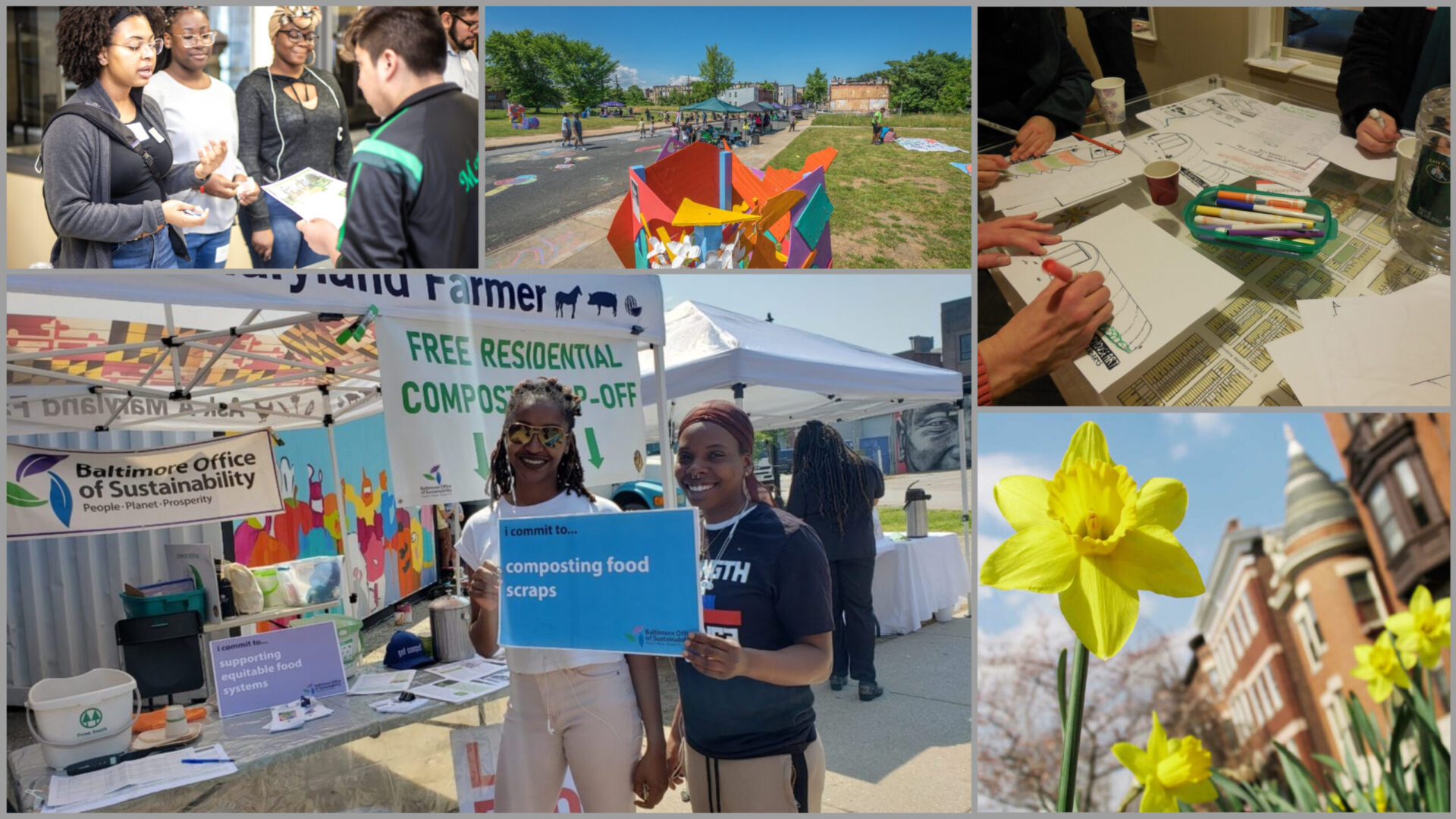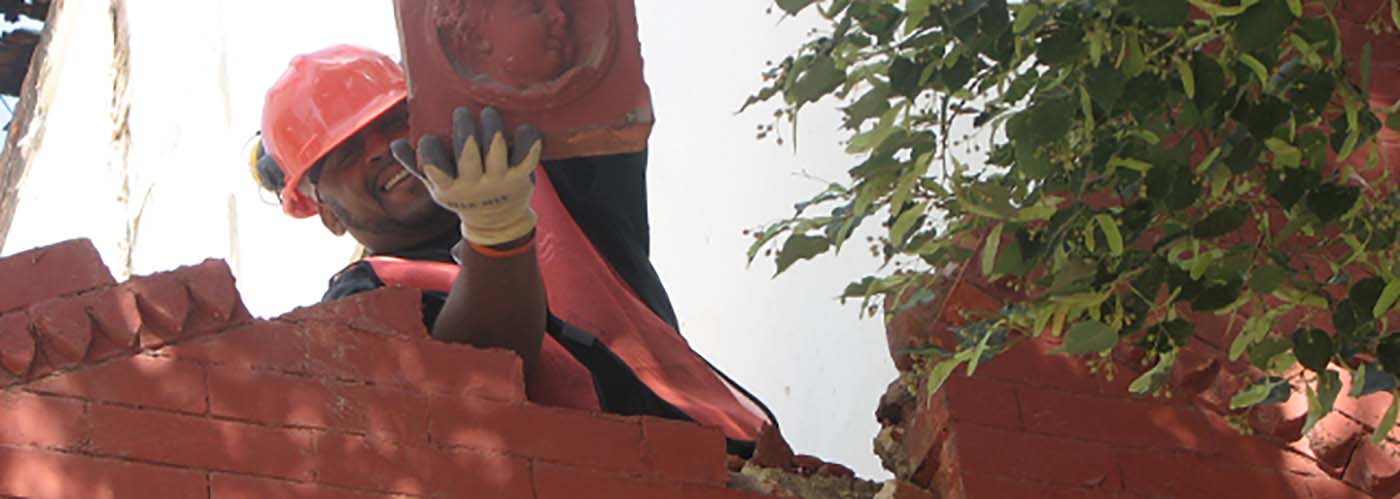
The Waste-To-Wealth Initiative aims to grow businesses in Baltimore City, while reducing our overall waste. By supporting businesses that are making products out of valuable materials captured from our waste stream, these businesses help create the solid, middle-class jobs that Baltimore City needs to grow by 10,000 families.
Valuable resources that enter the waste stream are captured and re-used as an engine of economic development in the City of Baltimore; creating jobs and new products while reducing landfill volume. While several businesses in Baltimore have already engaged in re-use strategies, they need support from the city in order to succeed and grow. By fostering businesses that capture valuable resources before they even enter the waste stream, Waste-To-Wealth will create jobs, combat blight, feed resident-led greening efforts, and revitalize our neighborhoods.
The Waste-To-Wealth Program is designed to do this by targeting three high-value, primarily non-residential waste streams:
Food Waste
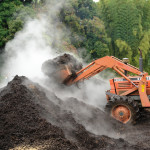
Baltimore City throws away nearly 100,000 tons of food waste annually. When captured, this waste can be composted and turned into a high-quality soil amendment for farmers and gardeners. Large-scale composting can be a smelly business, so the Waste-To-Wealth initiative is working with entrepreneurs to determine the appropriate scale and location for their efforts.
From 2016 through 2018, in partnership with the Institute for Local Self-Reliance and with a wide variety of stakeholders, we developed the Baltimore Food Waste & Recovery Strategy. This document lays out the reasons for rescuing edible food, recovering food waste, and composting; defines potential solutions; highlights seven local case studies; and sets ten major goals and 69 short, medium, and long-term strategies around the following topics:
- Commercial & Institutional Food Waste Reduction & Recovery
- Composting At Home & In The Community
- Creating Scalable Composting Infrastructure
- Composting in K-12 Schools
With support from the National Resources Defense Council and the Rockefeller Foundation, we have hired Ava Richardson as our new Food Matters Technical Advisor to begin work on implementing this strategy. She can be reached at 410.396.9508 or ava.richardson@baltimorecity.gov.
Watch Mayor Pugh’s press conference on this exciting initiative!
Construction and Demolition Waste
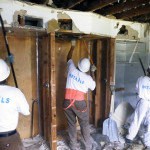
Construction and demolition waste is made up of the building materials created from construction and demolition. Baltimore produced 286,647 tons of C&D waste in 2012. This is equivalent to 41% of Baltimore’s overall solid waste. Through the mayor’s Blight Elimination Program, Baltimore City will be taking down an average of 400 vacant row houses per year. Deconstructing, rather than demolishing these buildings, would enable the recovery of valuable bricks and lumber which are otherwise likely to be landfilled. The Waste-To-Wealth initiative is working with city agencies to make deconstruction a required component of all our housing demolition contracts. We are also working with deconstruction companies to secure warehouse space for the accumulation of materials before they go to market.
Wood Waste
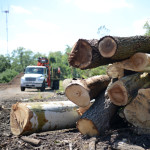
Although wood waste makes up only 6% of Baltimore City’s solid waste, or about 44,072 tons, much of it comes from the tree maintenance activities of the City Forestry Division. Baltimore City government is in a unique position to actively manage our wood waste so that we capture the highest value from it. Rather than chipping and mulching all of this wood, the Waste-To-Wealth initiative is working with the City Forestry Division and private sawmills to sort and mill high-quality logs for use as lumber.
In 2015, The Office of Sustainability in collaboration with the research group Peer Aspect created the Waste-To-Wealth Report. This document quantifies and characterizes the Baltimore City solid waste stream, and evaluates opportunities for waste diversion and re-use within the city. The report makes the following recommendations, which will guide the Waste-To-Wealth Initiative moving forward:
Establish a Waste-To-Wealth Incubator
Finding and affording suitable land to operate on is a major barrier for start-up waste-to-wealth businesses. A city-sponsored Waste-To-Wealth incubator will address that issue by offering a facility where start-up recyclers can learn from seasoned entrepreneurs, and have a suitable, affordable site to run their operations.
Status: Ongoing
Create policy & legislative changes to support food waste composting industry
This step includes changing food waste composting from a forbidden to a conditional use in the Chesapeake Bay Critical Area, where much of the appropriate industrial land for composting is located. It also includes exploring legislation similar to Massachusetts food waste ban, which helped kick-start dozens of new composting businesses throughout that state.
Status: Ongoing. Our office is working with multiple partners to create Baltimore’s first city-wide food waste strategy
Address city operations to make Camp Small a zero-waste facility
Camp Small is the site where the City of Baltimore currently processes it’s wood waste. Enhancing operations at this site to include log sorting for sawmills and organics composting could make Camp Small a zero-waste, cost neutral facility, while also capturing a higher value from the City’s wood waste.
Status: Launched! Check out http://treebaltimore.org/programs/camp-small/ to learn about the program!
Identify partners to create the first Neighborhood Grow Center
Ultimately, The Office of Sustainability aims to help create sites where citizens can have access to the value-added products coming out of the City’s waste stream. These ‘community greening centers’ would be a citizen’s source for locally produced compost, re-usable buildings materials, seedlings, saplings, and much more. The City’s Department of Public Works (DPW) has taken this concept under their wing since the 2016 pilot and has successfully conducted two years of pop-up GROW Centers and workshops across the city from 2018-2020.
Status: Complete! Learn more about DPW’s successful implementation of this program here: https://publicworks.baltimorecity.gov/grow-center

